End of Season 6 General Report, Part 2 of XDivided We FallOutside the Walls of ViadazaThe city of Viadaza was belching black clouds, foul and noisome fumes drifting eastwards, inland. The dead, both those once undead and those lucky enough never to have stirred post-mortem, were being burned by the thousand. For two whole days the army of the Reman Morrite Crusade had busied itself with piling corpses in the city squares and upon the stone built wharves, then after a generous dousing with oil, tar and pitch taken from the well-stocked warehouses, had set them alight. Within an hour there were few who could bear to stay within the city walls, not because of the heat, but because of the vile, vomit inducing stench of burning mountains of flesh. Most of the crusaders removed themselves to the sprawling army camp outside, where the smoke was lifted by its passage over the walls, then carried by a westerly breeze to pass mostly overhead, only occasionally lowering heavy, greasy coils to sicken those below.
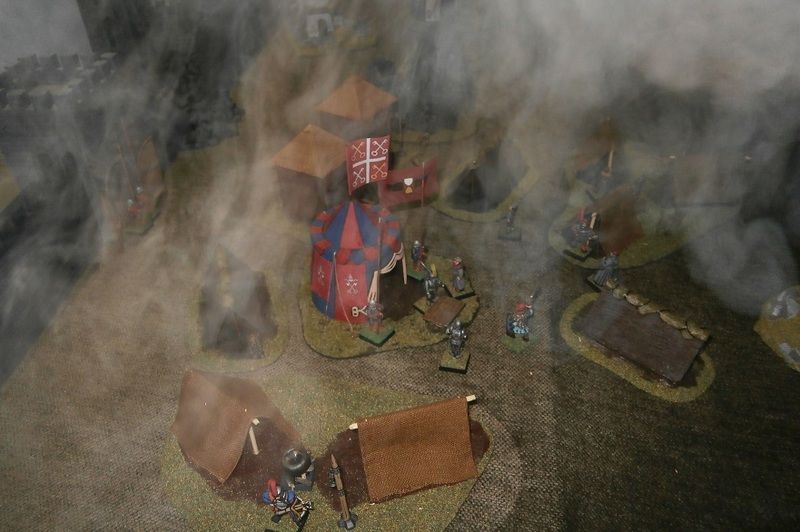
The camp contained of hundreds of tents and sod-walled huts, in places arranged tidily, but largely consisting of a higgledy piggledy confusion of different sized structures placed wheresoever the soldiers happened to stop. Dotted throughout were fires and braziers, originally intended for cooking and to illuminate the otherwise ominous night, but now either heaped with smoking herbs and green sticks, or filled with smouldering incense to fend off the horrible stink pouring from the city. Near the southern stretch of walls stood a large tent of brightly painted canvas, belonging to the crusading army’s military commander, General Urbano d’Alessio, the hero of Pontremola. Above it flew two flags, the highest, and thus pre-eminent, was the cross-keyed standard of the Reman Morrite Crusade, while the lower was the raven-winged hourglass of the Viadazan crusade, now the general’s personal standard. The general himself, in full armour, casually shouldering the massive blade with which he had slain the vampire duke of Miragliano, stood before its open front. Beside him was Father Biagino, the unassuming Morrite priest the general had now recognised as a sturdy ally in the fight against the horrors of the north, being not only insightful and useful, but increasingly influential. Best of all, he was not remotely aloof as were so many clergy, and was willing to suffer a soldier’s lot without complaint.
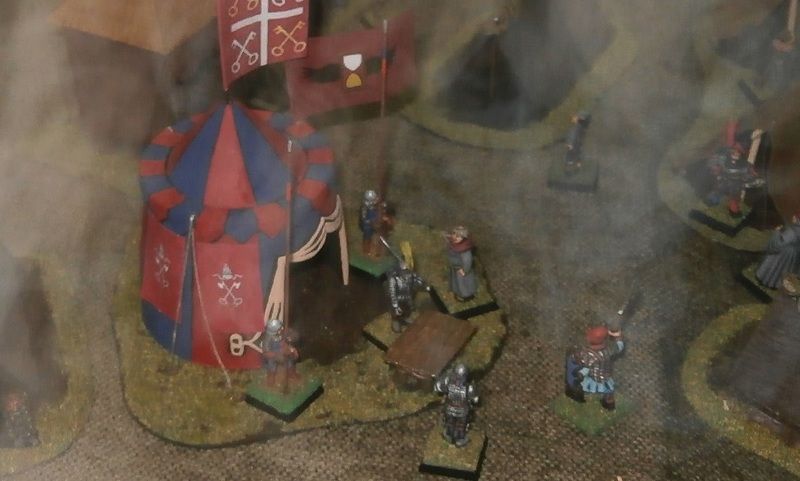
Not that Biagino looked like a soldier, what with his tonsured head and a paunch evident even in his loose cassock. Nor that he would describe himself as happy with his lot, for his sleep was wracked with nightmares and his waking filled with doubts, the two difficulties feeding off each other in a miserable spiral. But he was resigned to his fate. He had barely left the general’s side during the last few days. Now he was listening to what a Reman captain had to report to the commander.
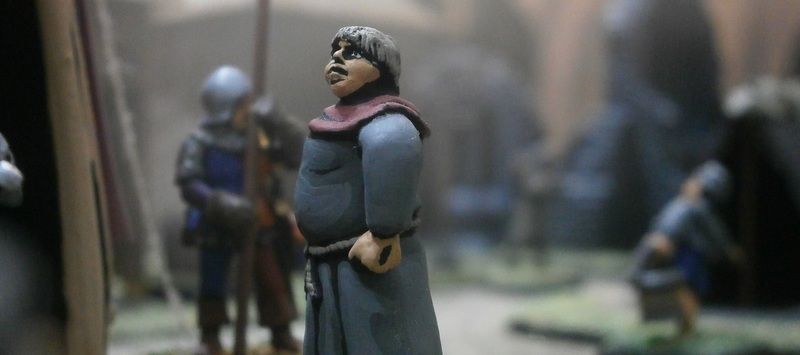
It was not good news. The captain and his company had been scouting the Trantio road some distance south of Busalla, where he had learned of the sacking of the town of Scorcio by a large force of ogres. He returned quickly to the camp, binding his own men to silence. He knew, however, that there were others with the same story to tell, and had indeed encountered several groups of refugee Scorcians on the road. Most admitted they had fled this way not merely because it was the easiest escape route, but because the crusading army had gone this way and who better to offer them protection than the soldier-servants of the gods?
“I reckon before it grows dark the entire army will know,” the captain said. “The news is spreading fast, your excellency, even as we speak.”
Biagino felt the now familiar panic welling inside. Yet again, he had dreamt this, and more than once. His oneiric visions had repeatedly twisted this Reman Crusade and the doomed Viadazan crusade of last year into one, so that the cheers of soldiers celebrating battlefield victory unfailingly transformed into the wails of citizens as yet another town fell to the enemy. He had thought the nightmare was born of his weakness, allowing fear and doubt to hold him in their grip, yet now he saw the truth of it. Morr had guided his dreams, and although the foe’s true face remained hidden, it was revealed that they would strike a terrible blow just as the crusaders’ backs were turned, and so turn victory into defeat.
The general drew all that he could from the captain, learning that the ogres were Campogrottan, perhaps bolstered by mercenaries come over the mountains; that they had looted the town as thoroughly as they had done to every settlement in the city state of Ravola; and that their leader was Razger Boulderguts, the tyrant general commanding the mysterious wizard Lord Nicolo’s forces. He then turned to Biagino.
“What happens then, father, when this news does the rounds in the camp?”
Biagino frowned. “It doesn’t bode well for harmony amongst us allies. If Scorcio is fallen then the young Lord Silvano may not wish to march any further with us. He was made ruler of Trantio by his father, which makes Scorcio his.”
“His father stole the realm of Trantio, and now the brutes are doing so too,” said the general. "Is there really any difference?"
“I do not think the young lord sees it that way. I have spoken to him. He idolises his father – seeing neither greed nor cruelty, only stern nobility. His father humbled the Astianans when they threatened to strangle Pavonan trade, then marched north to remove a warmongering tyrant from Trantio, thus freeing its people. To him his father is a hero, the stuff of myth and legend, but these ogres are nothing more than cruel robbers.”
“Well,” said the general, “Lord Silvano is right about the ogres, at least. Worse than looting and plunder, the brutes have probably eaten the populace too. But will Silvano leave us, forsaking his oath to serve Morr on holy crusade?”
“Considering what he did to Ravola, Razger Boulderguts probably considers Scorcio a mere aperativo, the city of Trantio being the main course. How can Lord Silvano stay here with us when he is honour bound to protect Trantio?”
“Ha!” laughed General d’Alessio. “He is honour bound to complete this crusade. And besides considerations of this duty and that oath, even if he did leave this very night he could not hope to reach Trantio in time to save it from destruction.”
“He is young and hopeful, and will likely try anyway,” said Biagino.
“Yes, probably so,” agreed d’Alessio. “Silvano fought beside the Campogrottan brutes in the battle, did he not?”
Biagino had forgotten that. “Yes, he did. They fought the undead riders together, and for some time, before he was saved by the timely intervention of his foot-soldiers.”
“So, while he and the brutes stood together against the foe here, the brutes’ cousins were robbing him of his possessions to the south? It seems to me that there is a cruelly clever cunning at play here. This Campogrottan Wizard Lord sends his soldiers, man and ogre, to join the crusade, and then when the Pavonans march north with them, he begins plundering their undefended towns. He fights as both their ally and their enemy at one and the same time.”
Biagino now wondered about the Wizard Lord Nicolo Bentiglovio, remembering a niggling doubt that had tickled at the edges of his mind. Driven from his realm many decades ago, Nicolo returns unnaturally old and retakes it, with an army of mercenary ogres. Was he in fact a vampire? Did that explain his remarkable longevity? If so, perhaps there was an alliance between him and the vampires to the west? Perhaps they intended to carve out the north of Tilea between them. He did not voice these concerns, however, for if it were true he had no doubt the general would work it out for himself, and if it were not true, he did not want to encourage a misconception. Besides, he had dreamt nothing of the sort, and so could not hope that this particular insight was gifted by Morr.
The general was thinking, scraping the edge of his shouldered sword against his steel pauldron as he did so. “It seems,” he announced, “that we are to be tested in even more ways than I ever imagined – and in truth I thought I had imagined the worst. We are now surrounded by enemies, to the north and south, and even if we do not divide the army to march both ways, it could well do so of its own accord. Furthermore, we have potential enemies in our midst too, a whole battalion of Campogrottans. We must take measures to ensure they cannot do us harm. I must speak with his Holiness.”
The Reman captain coughed - not the sort of wracking cough gifted by the miasma emanating from the city, but short and sharp. Both general and priest looked at him.
“Yes?” asked the general.
“Beg pardon, your excellency, but the Pavonans already know what has happened. I noticed considerable noise and fuss in their camp as I came here to you. They looked to be arming themselves.”
“Leaving already? Without seeking my permission?”
“They looked to be readying themselves for a fight,” said the captain, “not for the march.”
Suddenly Biagino understood. “They’ll be after vengeance against the Campogrottan brutes in our army. They have been tricked, and mocked when the brutes helped their young lord in battle. All Pavonans are proud, even the common soldiers. They think their faith is more perfect than everyone else’s; that all they do is right and proper. If they can hate dwarfs so much as to banish them from their realm, how much more will they hate these brutes? They probably expect us to thank them for the slaughter they are about to cause.”
“We must act now,” said the general. “No time for an audience with his Holiness.” He turned to the Reman captain and the Cathayan officer by his side. “Gentlemen, muster your men and make haste about it. Not only do we need to restrain the Campogrottans, we must get between them and the Pavonans. If we act quickly we might prevent this army mortally wounding itself.”
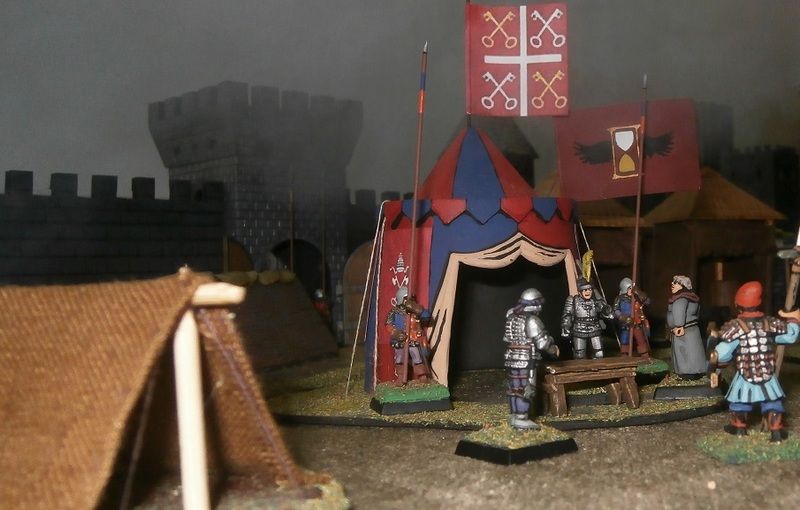
…
Causing a StinkWhile the arch-lector’s soldiers marched to the Campogrottan quarter, Father Biagino hurried to find young Lord Silvano. The lad had always seemed amenable, and honest – perhaps even too much so for the world of Tilean politicking – and Biagino hoped to persuade him to order his men to stand down. Near to the Pavonan camp the stinking smoke thickened as the breeze died away and the noisome pall descended to linger a while. Looking around, Biagino quickly realised he was probably too late. There was hardly anyone about, the soldiers had already gone. Outside Lord Silvano’s pavilion there was only one guard, and a handful of wounded men hobbling near the huts.
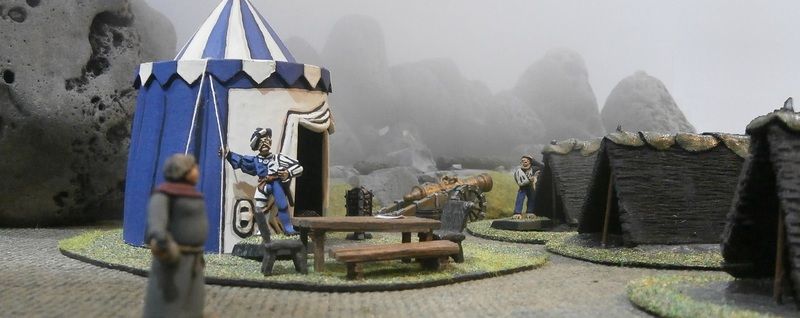
“I wish to speak with Lord Silvano,” said Biagino.
The guard, a large and moustachioed fellow, sniffed. “Not here,” he answered, a rudely brief reply considering he was addressing a priest of Morr.
“Then where is he?”
The guard grinned. “Gone to teach the Campogrottans a lesson in manners, but not the kind they’ll get to put into practice later.”
Biagino pelted off through the camp as fast as his legs would carry him. He had never been much of a runner, and the thickly foul air did not make it any easier. But then, he hoped, it may have slowed down the Pavonans too. As he approach the rocky outcrop behind which the Campogrottans had settled, he could hear shouting. Unwilling to hurtle into the middle of a skirmish, he slowed his pace and picked his way more carefully between the huts. The first Pavonans he saw were handgunners, who were making ready their pieces. Halting, he consoled himself that he had not yet heard any shots, and so the fighting had not yet actually begun.
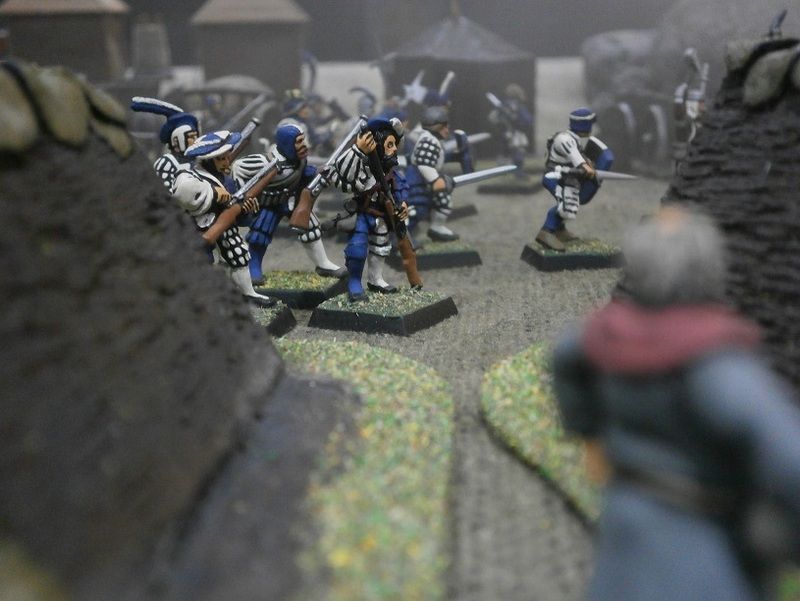
He stepped back, then crept behind the huts in the direction the Pavonans had been facing. Crouching behind a large barrel he peered over to see what exactly was confronting them. He was much reassured to see that it was a regiment of the arch-lector’s Cathayan Guard. They had arrayed themselves to block this particular access to the Campogrottan’s camp – an opening in one of the many rocky ridges that peppered the land around the city. As the Pavonans were not moving on, he decided there must be other loyal troops blocking the other gaps, no doubt also facing bands of angry Pavonans.
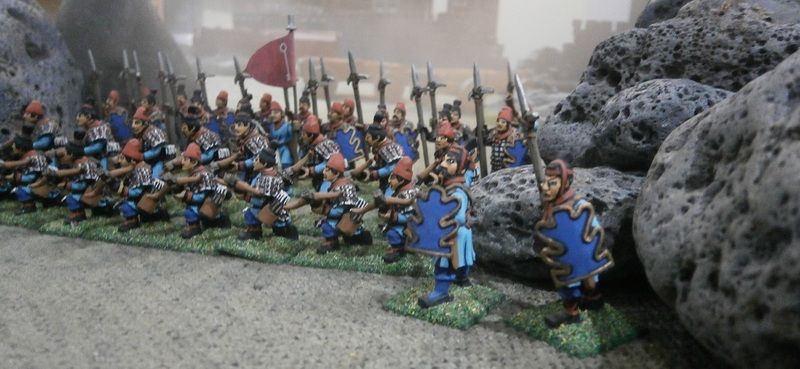
The Cathayans had formed into a double ranks of crossbows, the first rank kneeling, while behind them stood a body of soldiers armed with the somewhat odd looking halberds they preferred. An officer and a sergeant stood beside them while their banner, bearing a single Morrite key, fluttered above. It was not them doing the shouting.
The Pavonans stood close, so close in fact that a volley from the crossbows now would prove very bloody, very deadly. They were somewhat disorganised, and although neatly liveried in their blue and white (as always), they looked more like a rabble than a body of soldiers ready for battle. Biagino wondered if this was because they were unofficered, acting without orders, without direction. They certainly seemed to lack discipline. As well as the handgunners, he could see halberdiers and swordsmen, muddled together, and all as tense as an angry crowd set upon lynching a hated felon.
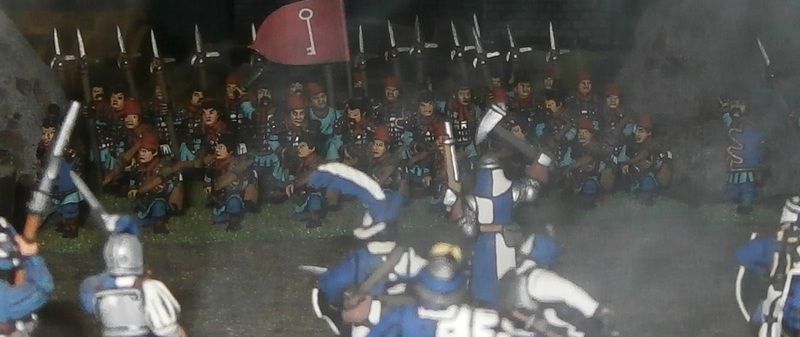
Some Pavonans were coughing, the stench here threatening to overwhelm them, but all had drawn their blades or were preparing their handguns. Moving around a little Biagino looked to see who was doing the shouting. He had already decided it was not Silvano, but he wondered if the young lord was here, watching, or with another mob at another gap. Perhaps he had lost control of his unruly soldiers, whether willingly or not. Then he could see the man doing the shouting. It was a stern looking fellow, armed with somewhat oversized hammer and pistol, which nevertheless he wielded with ease. By the steel plate hanging at the man’s chest, Biagino recognised him as a provost.
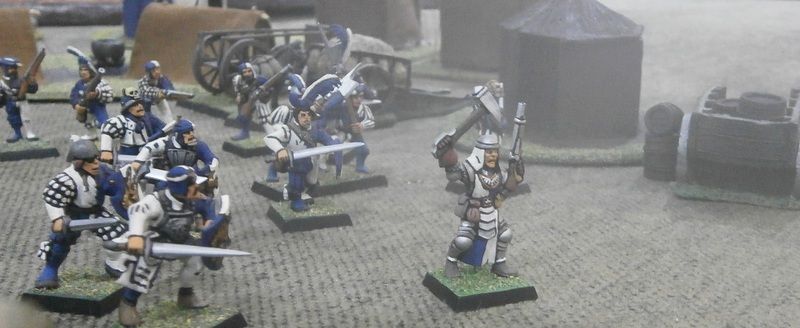 Trust the Pavonans
Trust the Pavonans, he thought,
to have a provost who stirs up trouble rather than quelling it.
The provost was clearly agitated, moreso than the men behind him, his voice straining to speak so loudly whilst breathing the poisoned fumes fogging the camp.
“This is folly. Why would you defend such villains? You have no right to bar our way. I would see justice done here this day, yet you would protect them. Their very presence here befouls this holy crusade. Perhaps you do not see it for you yourselves know not the glory of Morr. Your lack of faith means a lack of understanding. Besides, what is it to you? This is Tilean business, Pavonan business; you have no right to prevent us meting out justice.”
The Cathayan captain spoke with a heavy accent, and much more calmly than the provost. “We have our orders. You are to return to your camp. The matter is in hand.”
“It is not! While those abominations live justice is ill served. They are enemies, who have raised their hand against our prince. And you would have us leave them be?”
Behind him the Pavonan soldiers’ protests grew louder, yet they did not press any further forward.
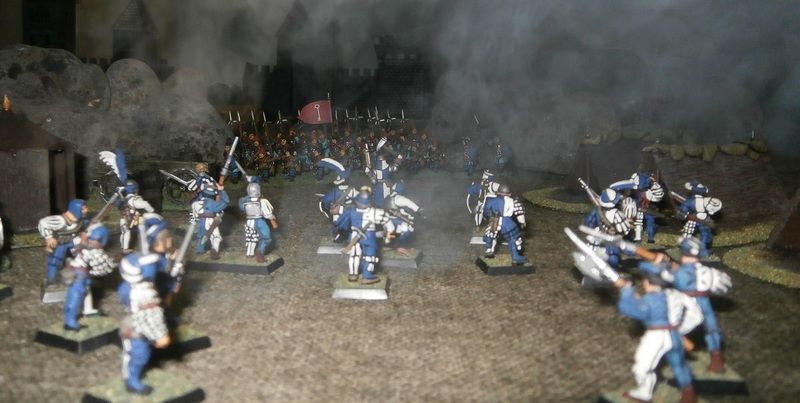
“You are not arguing with me,” said the Cathayan, “but with General d’Alessio, whom your own master has accepted as his military commander, and who serves in turn the arch-lector. It is by the general’s order that we are here. Leave or I
will give the order to shoot.”
The Pavonan provost laughed. “The arch-lector is not the apex of power, but holy Morr, who is above all men and their offices, above all gods. It is not for the likes of you to tell Tileans how to cleanse their own land and make it good in the eyes of Morr.” He turned to his men, raising his hand, then shouted: “Handgunners to the fore. Form on me. Two ranks.”
The handgunners began to move hesitantly forwards while the others stepped aside to get out of their way. Just then a sound was heard from beyond the rocks – a growling roar at once both angry and pained. The Cathayan officer turned to look. Biagino was impressed that not one of his soldiers so much as stole a glance, simply standing at the ready awaiting orders, the very definition of discipline. The advancing Pavonans halted, uncertain, straining to peer beyond the ranks of Cathayans.
Biagino could not be certain but it sounded like an ogre.